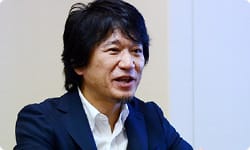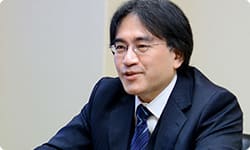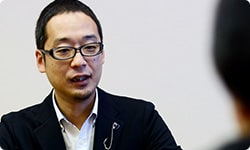He Doesn't Get Intimidated or Flinch at Anything
Usually when you have a big project where there doesn't seem to be an end in sight, people on the team start to get tired. But it seems like with Go Vacation, you never lost momentum, and people were really excited about making it the whole time. If not this project wouldn't have been completed in two and a half years. Why do you think that is?
I think that having outside people working on it with us was a huge factor. Usually when we just work with in house staff, it takes a long time to get to the first illustrations from the preparation period because we lay the developing foundation and conduct research beforehand.
The Ridge Racer team does their best work in the homestretch, after all.
Yes. (laughs) But this time we were working with four other companies, and they all got test versions to us incredibly quickly.
So the visuals kept changing which helped you to spur each other one. And since you had an outside team, it brought on a friendly sort of rivalry.
Yes, it did spur the team on. And that continued periodically for those two and a half years, which I think was really our secret for not losing motivation.
Sakagami-san, I'm sure you've seen this project from an even wider scale; what did you think of it?
To be honest, in the beginning I thought, "This is a bit too much!" (laughs)
(laughs)
But the ties between group members were really strong. There was this deep seated hospitality there. The planning team and the programmers and the visual team, they all tried to see just how they could follow up on each other's work. Everyone on the team went out of their way to help each other without being asked, and I think that's why we were able to keep working.
And I actually think that declaring off the bat, "We'll make this in a year and a half," turned out to be a good thing. (laughs) It did build this feeling like, "We've got to band together to make this work!"
It would have been really tough to get it done in a year and a half. Except that if I'd said it would take us two and a half years, they never would have okayed the project. Actually, I would never have made this proposal. (laughs wryly)
But I think that this time that declaration you made really worked out well.
You really accomplished something incredible, but it does feel like Kobayashi-san has really raised the bar here. To put it a bit differently, you did something that would keep everyone on their toes.
(laughs)
But I think that players will be really satisfied because of it. With this one game, the whole family can play games for every season and enjoy being at a resort all year round.
I feel like we made a game that really does what we set out to do. I think that all our hard work will really come in handy in the future. Sorry, I didn't mean to start bragging about my wounds! (laughs)
(laughs) So when you made this game you set out to make an all-season game that anyone could play, but I also get the impression that you have attained the pinnacle in one of the ways video games are developed.
Thank you very much.
By the way, last time I asked Sakagami-san about his background, so could you tell us about your background, Kobayashi-san? When did you first get into computers and video games?
I started playing video games when I was in first grade. One of my classmates had the original Space Invaders6 at his house. 6. Space Invaders: An arcade game that took the world by storm following its release in 1978.
He had the unit at his house?
Yes. That was when Space Invaders was really popular, and it was the first video game I ever played. When I was in fifth grade, the Famicom system went on sale, and I bought one right away. I've grown up with video games for about as long as I can remember.
So video games were a part of your life growing up, and you really loved them.
That's right. I even worked part-time as a debugger, and I always had a vague desire to work in the creative field. So when I was looking for work as I was about to graduate from college, I naturally wanted to get into game development, which I was always attracted to.
What did you major in, Kobayashi-san?
Management Engineering with a focus in Scientific Engineering, but I didn't really focus on studying programming. I couldn't draw that well either, so by process of elimination the only field I could apply for was for planning. Like a lot of people, all I had was confidence without anything concrete to back it up. (laughs) So as a new graduate, I applied to what was then NAMCO7, but I didn't make it past the final interview. I drifted a bit after that, and then I started working at a small game development company. 7. NAMCO (currently NAMCO BANDAI Games Inc.): A company founded in 1955 that develops video game software and operates video arcades. In 2006, it merged with the video game development division of BANDAI Co., Ltd. and restarted under the name NAMCO BANDAI Games Inc.
So you weren't working for NAMCO from the beginning of your career.
No, I wasn't. The company I worked for was making their first video game that year, and there was only one manager who was my boss, and the development staff was all new graduates. I was the entire planning department, and there were only two programmers and one designer, so the development atmosphere was a little worrisome to say the least. And then the high ups told us to, "make something."
What? They just said, "Make something"? That's something else. (laughs)
I wrote up proposals every day, but nothing ever came of them. I also acted as support for the sales people when they did their rounds. Finally, the summer after I started working there, I was able to take part in developing a game for the Playstation. I was really into snowboarding at the time.
Oh, so that's the connection.
That's right, that's sort of where the connection comes in.
Yes. So I decided to make a snowboarding game. Sakagami-san's Ridge Racer had just come out, and I studied it as if there was no tomorrow! (laughs) I figured that we could make an action racing game unlike anything that was out there if we added snowboarding to a game with a similar style. So that's the design I came up with, and it became the first game I ever made. It got good reviews from some of my friends who played it, but they also said, "It'd be great to have a game that wasn't all racing. Maybe a skiing game where you could actually go to a resort and enjoy the slopes there."
Huh? I feel like I've heard this before. (laughs)
However, with the cross-shaped directional pad interface being used at the time, skiing slowly down a realistic, gentle slope wasn't very exciting and didn't really make for a good game.
So you turned the idea down once in your head back then.
Right. But then the Wii console came out, which lead to the plan to make We Ski. After I made a few more snowboarding games at my previous company, around my 30th birthday I decided to try to get into NAMCO again because I wasn't able to extinguish my passion towards them that I had since my days playing arcade games. And I guess the timing was right, because they hired me. After I got in I worked as director on several of the Ridge Racer games.
It seems like you went through some tough times, but I see you really gained something valuable from it.
I think so.
I'm not sure if it's due to those experiences (looking at Kobayashi-san) but he doesn't get intimidated or flinch from anything.
I think I'm beginning to solve the mystery of how you were able just come out and say, "50 is a better sounding number, so we're making 50."
I'm sure that he actually put a lot of thought into that, but the words that came out of his mouth ended up being "It's a better sounding number." (laughs)
So it's that background that made it possible for you to say that without flinching and without any second thoughts.
Oh, you may be right about that.
I'm not sure... (laughs)
But you can't do anything if no one believes that it can be done.
That's so true!
That's what makes creating games interesting, because no one ever knows from the very beginning that they'll be able to make the game they want to make. We've come this far because every single time, someone believes really strongly that they can make it happen.
Yes. Saying something makes it a reality. That's the kind of power that words have.
Kobayashi-kun is always the one who says, "We can do this!" (laughs)
That's right! (laughs)



